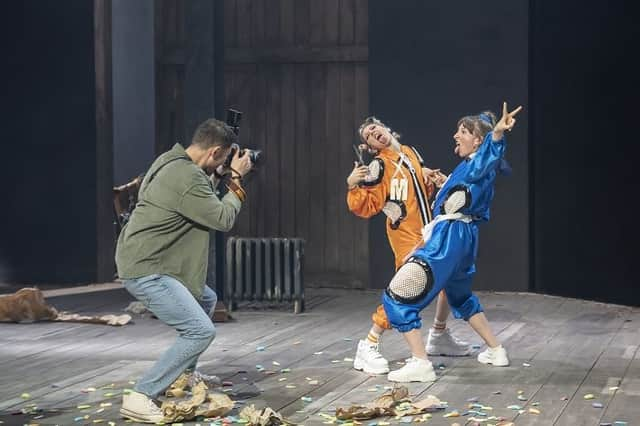Three plays or one? Our review of ambitious new trilogy Rock, Paper Scissors at Sheffield Theatres


THE FULL Monty movie famously opens with a clip from a 1960s promotional film called Sheffield, A City On The Move.
Audiences laughed as it recalled steelworks closing in Thatcher’s Britain of the 1980s.
This ingenious trilogy — brilliantly and faultlessly staged and performed simultaneously across three theatres by one cast of 14 superb actors racing from one stage to another —again shows Sheffield moving on.
Is this real change, is it change for the better, and what about Steel City’s history — the sweat and toil of generations of workers?
Chris Bush, writer of the wonderful Standing On The Sky’s Edge, once more poses questions as the three plays — all of equal length — pan out over seven and a half hours.
Spenser and Sons, makers of scissors, an overlooked aspect of the city’s steel renown, is on its last legs — the workforce left is merely a manager and four apprentices after the boss just died.
The promise of a huge order from China is the only thing that keeps the factory open.
But the fight is on between family of members as to the site’s future.
Susie, ageing rock-star sister to Eddie, the late owner, has arranged for a photo session for her latest discoveries, a band painfully called Co-Codamol (Coco and Molly geddit?) aiming to create a rock venue, with echoes of the The Leadmill.
Faye, Eddie’s adopted daughter, has decided to come down with her partner Mel and a design consultant to examine the possibility of luxury apartments.
Confusion reigns and the ensuing chaos brings plenty of laughs.
Each play is free-standing, but weaved cleverly together as a whole work.
In the main Crucible theatre, Rock fills the space magnificently through Ben Stones’ set, recreating its cathedral-like lighting.
Denise Black brings (Dr) Susie, the boss’s daughter energetically to life, battling sexism with old friend Leo (Andrew Macbean) alongside offering worthy advice.
Anthony Lau uses lively singing and dancing and witty, erudite exchanges about Einstein and thermo-dynamics to effect, but it lacks emotion and seems too long.
Paper, staged at the Lyceum Theatre, with another great set by Janet Bird, touchingly focusses more on relationships — a gay couple, fathers and daughters and two close friends.
Robert Hastie’s direction is more intense and engaging, dealing with the complexities of mysogyny and homophobia.
Scissors, directed by Elin Schofield with evocative workplace set by Natasha Jenkins, is the standout piece and is performed in the more intimate Studio surrounds.
Here we get a sense of what’s its all about — the young apprentices, hoping for a future angry at being exploited on £4 an hour to keep the manager’s dream alive, while harking back to the olden days when much of the workforce got the sack.
Joe Usher, making his stage debut, furiously takes the privileged middle class Co-Codamol band members to task.
Jabez Sykes turns a tiny role in Rock into a funny, yet also serious, gem — putting me in mind of Sheldon from the Big Bang Theory, and there’s a lovely reveal along the way.
There are no weaknesses to the casting and performances.
Natalie Casey (Mel) and Samantha Power as Faye nicely spark off each other, while Guy Rhys is a brooding presence as Omar, with daughter Zara, played by Lucie Shorthouse, displaying lots of independence.
Dumile Sibanda, as warm-hearted Ava and Maia Tamraker as scary Liv, make a lovely double act.
Leo Wan is likeably naive as designer Zander, Alastair Natkiel is sympathetic as Billy the photographer and Andrew Macbean makes a charmingly well-heeled Leo, while Chanel Waddock and Daisy May are a delightful Coco and Molly.
Full marks for ambition —this production is definitely a cut above the rest.